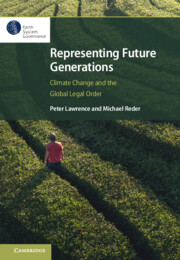1 - Introduction
Published online by Cambridge University Press: 19 September 2025
Summary
The Introduction sets out the research question of the book viz: the question of whether future generations ought to be represented in the global legal order and institutions to address the climate change challenge and, assuming a positive answer to this, how best such representation should occur. The massive bias against the interests of future generations in current climate law and policy-making is demonstrated. This provides a powerful rationale as to why there is an urgent need to explore proxy-style mechanisms to represent future generations. The pragmatist methodology (in the tradition of John Dewey) of the book is explained. This involves analysing existing practices, and values which are incorporated into these values, and extending them to deal with new problems. The legal realism methodology of the book is also explained, including its application to the sources of international law. The strong links between the book and Earth System Governance scholarship are set out; finally, the structure of the book is explained.
Information
- Type
- Chapter
- Information
- Representing Future GenerationsClimate Change and the Global Legal Order, pp. 1 - 20Publisher: Cambridge University PressPrint publication year: 2025
References
Accessibility standard: WCAG 2.0 A
Why this information is here
This section outlines the accessibility features of this content - including support for screen readers, full keyboard navigation and high-contrast display options. This may not be relevant for you.Accessibility Information
Content Navigation
Allows you to navigate directly to chapters, sections, or non‐text items through a linked table of contents, reducing the need for extensive scrolling.
Provides an interactive index, letting you go straight to where a term or subject appears in the text without manual searching.
Reading Order & Textual Equivalents
You will encounter all content (including footnotes, captions, etc.) in a clear, sequential flow, making it easier to follow with assistive tools like screen readers.
Structural and Technical Features
You gain clarity from ARIA (Accessible Rich Internet Applications) roles and attributes, as they help assistive technologies interpret how each part of the content functions.
